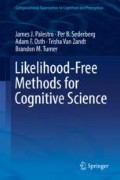Abstract
In this chapter, we will present several algorithms, which differ in how they approximate the likelihood function and generate proposals for the posterior distribution, for performing likelihood-free inference. Four classes of algorithms—rejection-based, kernel-based, general methods, and hierarchical—will be discussed in great detail. We will provide a brief overview of the origins of each class as well as discussing the advantages and disadvantages of each. Finally, we will close the discussion by offering guidance on how to choose the appropriate class of algorithms for use in a given situation.
Access this chapter
Tax calculation will be finalised at checkout
Purchases are for personal use only
Notes
- 1.
The notation Model(θ) describes the distribution of a random variable X, whereas the notation Model(y|θ) denotes the probability density at the location y, conditional on the parameters θ, as in Eq. (1.2).
- 2.
For the curious reader, the file GibbsABC.R contains code to sample from the posterior using traditional Gibbs sampling, as well as the Gibbs ABC algorithm so that accuracy of the algorithm can be assessed. Within this code, the parameters of the conditional distribution are specified.
References
J.N. Rouder, J. Lu, Psychon. Bull. Rev. 12, 573 (2005)
J.N. Rouder, D. Sun, P. Speckman, J. Lu, D. Zhou, Psychometrika 68, 589 (2003)
J.K. Pritchard, M.T. Seielstad, A. Perez-Lezaun, M.W. Feldman, Mol. Biol. Evol. 16, 1791 (1999)
M.A. Beaumont, Annu. Rev. Ecol. Evol. Syst. 41, 379 (2010)
M.G.B. Blum, O. François, Stat. Comput. 20, 63 (2010)
B.M. Turner, P.B. Sederberg, Psychon. Bull. Rev. 21, 227 (2014)
B.W. Silverman, Density Estimation for Statistics and Data Analysis (Chapman & Hall, London, 1986)
W.R. Holmes, J. Math. Psychol. 68, 13 (2015)
J.A. Rice, Mathematical Statistics and Data Analysis (Duxbury Press, Belmont, CA, 2007)
P. Fearnhead, D. Prangle, J. R. Stat. Soc. Ser. B 74, 419 (2012)
S. Wood, Nature 466, 1102 (2010)
B.M. Turner, T. Van Zandt, J. Math. Psychol. 56, 69 (2012)
A. Gelman, J.B. Carlin, H.S. Stern, D.B. Rubin, Bayesian Data Analysis (Chapman and Hall, New York, NY, 2004)
C.P. Robert, G. Casella, Monte Carlo Statistical Methods (Springer, New York, NY, 2004)
S. Sisson, Y. Fan, M.M. Tanaka, Proc. Natl. Acad. Sci. USA 104, 1760 (2007)
P. Del Moral, A. Doucet, A. Jasra, J. R. Stat. Soc. B 68, 411 (2006)
T. Toni, D. Welch, N. Strelkowa, A. Ipsen, M.P. Stumpf, J. R. Soc. Interface 6, 187 (2009)
M.A. Beaumont, J.M. Cornuet, J.M. Marin, C.P. Robert, Biometrika asp052, 1 (2009)
S. Kullback, J.C. Keegel, J.H. Kullback, Topics in Statistical Information Theory. Lecture Notes in Statistics, vol. 42 (Springer, New York, 1987)
R. Douc, A. Guillin, J.M. Marin, C. Robert, Ann. Stat. 35, 420 (2007)
M.A. Beaumont, W. Zhang, D.J. Balding, Genetics 162, 2025 (2002)
N.J.R. Fagundes, N. Ray, M. Beaumont, S. Neuenschwander, F.M. Salzano, S.L. Bonatto, L. Excoffier, Proc. Natl. Acad. Sci. 104, 17614 (2007)
R.D. Wilkinson, Biometrika 96, 983 (2008)
B.M. Turner, P.B. Sederberg, J. Math. Psychol. 56, 375 (2012)
B.M. Turner, P.B. Sederberg, S. Brown, M. Steyvers, Psychol. Methods 18, 368 (2013)
B. Hu, K.W. Tsui, Technical Report Number 1112 (2005)
C.J.F. ter Braak, Stat. Comput. 16, 239 (2006)
R. Storn, K. Price, J. Glob. Optim. 11, 341 (1997)
G. Tong, Z. Fang, X. Xu, Evolutionary Computation (2006), pp. 438–442
J. Kennedy, R. Eberhart, Proc. IEEE Int. Conf. Neural Netw. 4, 1942 (1995)
R. Tanese, Distributed genetic algorithms, in Proceedings of the Third International Conference on Genetic Algorithms and Their Applications, ed. by D. Schaffer (Morgan Kaufmann, San Mateo, 1989), pp. 434–439
V.A. Epanechnikov, Theory Probab. Appl. 14, 153 (1969)
P. Kontkanen, P. Myllymäki, in Proceedings of the 11th International Conference on Artificial Intelligence and Statistics (Artificial Intelligence and Statistics, San Juan, Puerto Rico, 2007)
F. Chapeau-Blondeau, D. Rousseau, Physica A 388, 3969 (2009)
L. Excoffer, A. Estoup, J.M. Cornuet, Genetics 169, 1727 (2005)
B.M. Turner, T. Van Zandt, Psychometrika 79, 185 (2014)
Author information
Authors and Affiliations
Rights and permissions
Copyright information
© 2018 Springer International Publishing AG
About this chapter
Cite this chapter
Palestro, J.J., Sederberg, P.B., Osth, A.F., Zandt, T.V., Turner, B.M. (2018). Likelihood-Free Algorithms. In: Likelihood-Free Methods for Cognitive Science. Computational Approaches to Cognition and Perception. Springer, Cham. https://doi.org/10.1007/978-3-319-72425-6_2
Download citation
DOI: https://doi.org/10.1007/978-3-319-72425-6_2
Published:
Publisher Name: Springer, Cham
Print ISBN: 978-3-319-72424-9
Online ISBN: 978-3-319-72425-6
eBook Packages: Behavioral Science and PsychologyBehavioral Science and Psychology (R0)

